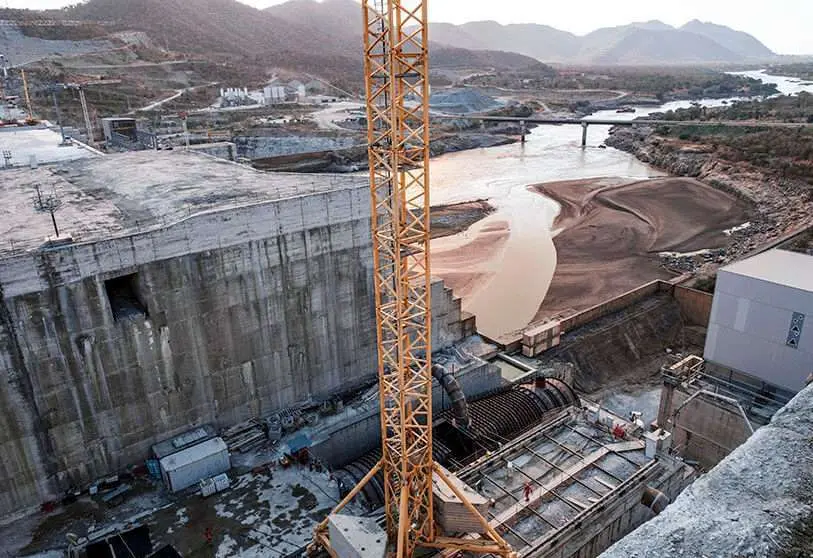The first episode of the water war seems to be endless. Almost ten years after Ethiopia announced the project to build the Great Ethiopian Renaissance Dam (GERD), no agreement has yet been reached with the other two countries involved in water resources management, Egypt and Sudan. Over the past year, negotiations have been resumed and repeatedly suspended, with up to 90% of the issues in dispute being understood, with 10% still unresolved, according to Sudanese Information Minister Faisal Saleh recently. Why? The sharp discrepancy between Addis Ababa and Cairo over the filling of the dam: the time, process and quantity, which compromises Egypt's access to its main source of fresh water, which may decrease by 25% for three years or more. So far, Khartoum has adopted a role more as a mediator in the conflict than as an active party.
On Monday, Sudan's Minister of Irrigation and Water Resources, Yasser Abbas, announced that his Egyptian and Ethiopian counterparts, Mohamed Abdel Aati and Seleshi Bekele, respectively, have agreed to resume negotiations, at the behest of Sudanese Prime Minister Abdalla Hamdok. The meeting, scheduled for Tuesday, will seek to advance "a comprehensive agreement that satisfies the interests of the three countries and realizes the aspirations of their peoples. Although the items on the meeting's agenda are not yet known, Al-Ain revealed that "procedural issues related to the role of observers and the issues pending negotiation" will be discussed. The meeting will also be attended by three observers from the United States, South Africa and the Commission of the European Union.
It should be recalled at this point that Egypt, Ethiopia and Sudan came close to reaching an understanding last February following the impetus given to the negotiations by the White House and the World Bank, which have emerged as the major mediators in the conflict. However, Addis Ababa's last-minute refusal to accept the terms of the agreement wiped out all the efforts made so far. Thus, over the last four months, events have been rushed and positions seem more distant than ever. At the beginning of April, the Ethiopian Prime Minister, Abiy Ahmed, unilaterally announced that he would start filling the press in the next rainy season, i.e. between summer and autumn 2020. In practice, this would mean storing 4.9 billion cubic metres in July of water from the River Nile. The goal is that within one year GERD will be filled with more than 18.4 billion cubic meters.
This was quickly denounced by both Sudan and Egypt. In the former case, Khartoum refused to accept an agreement on a bilateral basis with Addis Ababa. Furthermore, on Monday, Sudanese Information Minister Faisal Saleh declared that the filling operations of the dam should not start without consensus between the three countries, as it would violate principle 5 of the Declaration of Principles 2015 Agreement, which Ethiopia ratified, which stipulates that the filling will not start until the parties have reached an agreement on it. Meanwhile, in the second, Cairo opted to put its armed forces "on high alert". Ethiopia then responded by deploying missiles on its territory as a deterrent.
Even with this scenario, Sudanese minister Yasser Abbas has been optimistic about the future of the talks. "The minister expressed confidence in the ability of the three countries to overcome the current obstacles and reach an agreement that will address and absorb the problems related to the filling and operation of the GERD. Abbas reiterated Sudan's commitment to its principled position of negotiating in good faith and respecting the relevant rules of international law, as well as protecting Sudan's interests," Al-Ain was told.
In a statement issued by the Ethiopian Prime Minister's office ahead of the new meeting, he said Ethiopia was not "trying to harm other countries" by building the dam, since it was a necessity for the country, with more than 50 million people currently without access to electricity.
However, as The Africa Report has learned, "cautious optimism has now been complicated by the sending of a Sudanese letter to the UN Security Council in which it aligns itself with Egypt's demands", putting "in doubt the possibility of an agreement before the filling of the GERD reservoir begins".

According to the local media Walta Info, the Russian ambassador in Ethiopia, Evgeny Terekhin, has met with the Minister of Foreign Affairs of the African country, Gedu Andargachew. During the meeting, the head of the Russian diplomatic mission urged the tripartite to solve the problems in accordance with international law and accepted principles and reiterated the "readiness of Russia to help Ethiopia, Sudan and Egypt to reach mutually beneficial agreements in their negotiations on GERD".











